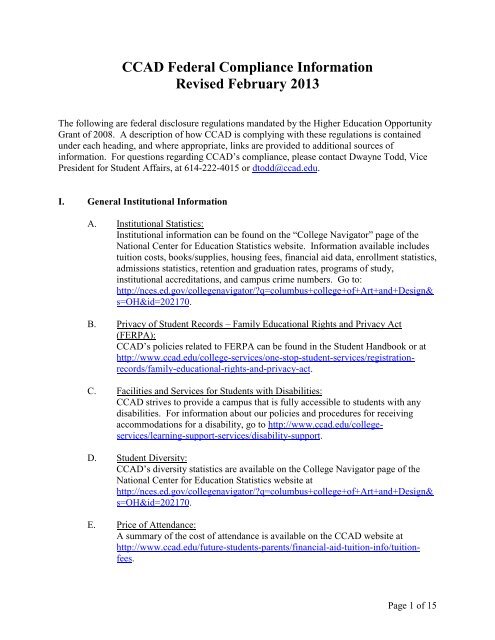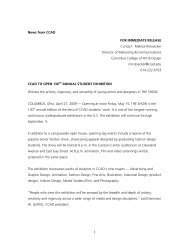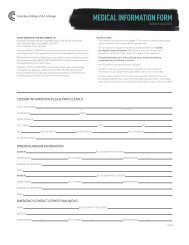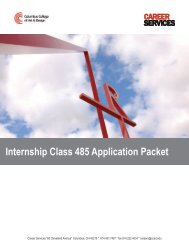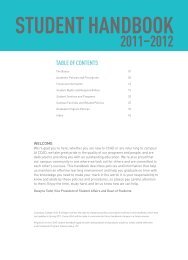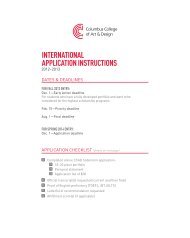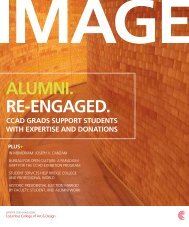CCAD Federal Compliance Information - Columbus College of Art ...
CCAD Federal Compliance Information - Columbus College of Art ...
CCAD Federal Compliance Information - Columbus College of Art ...
Create successful ePaper yourself
Turn your PDF publications into a flip-book with our unique Google optimized e-Paper software.
<strong>CCAD</strong> <strong>Federal</strong> <strong>Compliance</strong> <strong>Information</strong><br />
Revised February 2013<br />
The following are federal disclosure regulations mandated by the Higher Education Opportunity<br />
Grant <strong>of</strong> 2008. A description <strong>of</strong> how <strong>CCAD</strong> is complying with these regulations is contained<br />
under each heading, and where appropriate, links are provided to additional sources <strong>of</strong><br />
information. For questions regarding <strong>CCAD</strong>’s compliance, please contact Dwayne Todd, Vice<br />
President for Student Affairs, at 614-222-4015 or dtodd@ccad.edu.<br />
I. General Institutional <strong>Information</strong><br />
A. Institutional Statistics:<br />
Institutional information can be found on the “<strong>College</strong> Navigator” page <strong>of</strong> the<br />
National Center for Education Statistics website. <strong>Information</strong> available includes<br />
tuition costs, books/supplies, housing fees, financial aid data, enrollment statistics,<br />
admissions statistics, retention and graduation rates, programs <strong>of</strong> study,<br />
institutional accreditations, and campus crime numbers. Go to:<br />
http://nces.ed.gov/collegenavigator/?q=columbus+college+<strong>of</strong>+<strong>Art</strong>+and+Design&<br />
s=OH&id=202170.<br />
B. Privacy <strong>of</strong> Student Records – Family Educational Rights and Privacy Act<br />
(FERPA):<br />
<strong>CCAD</strong>’s policies related to FERPA can be found in the Student Handbook or at<br />
http://www.ccad.edu/college-services/one-stop-student-services/registrationrecords/family-educational-rights-and-privacy-act.<br />
C. Facilities and Services for Students with Disabilities:<br />
<strong>CCAD</strong> strives to provide a campus that is fully accessible to students with any<br />
disabilities. For information about our policies and procedures for receiving<br />
accommodations for a disability, go to http://www.ccad.edu/collegeservices/learning-support-services/disability-support.<br />
D. Student Diversity:<br />
<strong>CCAD</strong>’s diversity statistics are available on the <strong>College</strong> Navigator page <strong>of</strong> the<br />
National Center for Education Statistics website at<br />
http://nces.ed.gov/collegenavigator/?q=columbus+college+<strong>of</strong>+<strong>Art</strong>+and+Design&<br />
s=OH&id=202170.<br />
E. Price <strong>of</strong> Attendance:<br />
A summary <strong>of</strong> the cost <strong>of</strong> attendance is available on the <strong>CCAD</strong> website at<br />
http://www.ccad.edu/future-students-parents/financial-aid-tuition-info/tuitionfees.<br />
Page 1 <strong>of</strong> 15
F. Net Price Calculator:<br />
<strong>CCAD</strong> uses the <strong>College</strong> Board as a source for online version <strong>of</strong> the net price<br />
calculator, which details net price information by income categories and provides<br />
a web tool to help students calculate their tuition and fee costs. <strong>CCAD</strong>’s net price<br />
calculator is available online at http://www.ccad.edu/future-studentsparents/financial-aid-tuition-info/tuition-fees.<br />
G. Refund Policy and Requirements for Withdrawal and Return <strong>of</strong> <strong>Federal</strong> Financial<br />
Aid:<br />
<strong>CCAD</strong>’s policies regarding refunds, procedures regarding withdrawal from<br />
classes, and practices regarding the return <strong>of</strong> federal financial aid are described in<br />
the Student Handbook, available online at http://www.ccad.edu/ccadcampus/student-handbook<br />
and available in printed form to each student, faculty,<br />
and staff member annually.<br />
H. Textbook <strong>Information</strong>:<br />
<strong>CCAD</strong> faculty provide a description <strong>of</strong> required textbooks and materials for their<br />
courses in their online course descriptions, which can be viewed at<br />
http://iq.ccad.edu. Click on “Find Course Sections” in the left hand menu, then<br />
use the search fields to find the desired courses. If materials are required, they will<br />
appear as an attached document at the bottom <strong>of</strong> the course description under the<br />
heading “Available Media”.<br />
I. Educational Programs, Facilities, and Faculty:<br />
<strong>Information</strong> on <strong>CCAD</strong>’s academic programs, instructional facilities, and faculty<br />
can be found at http://www.ccad.edu/programs-<strong>of</strong>-study/majors. Additionally,<br />
degree requirements can be found at<br />
https://iq.ccad.edu/iqweb/Visitor/CommAccAcaPlan.asp and course descriptions<br />
at http://iq.ccad.edu/iqweb/Visitor/CrsCatal.asp.<br />
J. Accreditation, Approval, and Licensure <strong>of</strong> Institution and Programs:<br />
<strong>CCAD</strong>’s is duly licensed by the Ohio Board <strong>of</strong> Regents to grant our existing<br />
degrees within the State <strong>of</strong> Ohio. Additionally, our accreditations and affiliations<br />
are provided at http://www.ccad.edu/about-ccad/accreditation-affiliation.<br />
K. Copyright Infringement Policies and Sanctions (Including Computer Use and File<br />
Sharing):<br />
Copyright infringement is considered an act <strong>of</strong> academic misconduct when such<br />
material is used in support <strong>of</strong> academic projects. <strong>CCAD</strong>’s academic misconduct<br />
policies and potential sanctions are described in the Student Handbook in the area<br />
titled “Student Code <strong>of</strong> Conduct”, and are available online at<br />
http://www.ccad.edu/ccad-campus/student-handbook and in the printed Student<br />
Handbook available to each student, faculty, and staff member annually.<br />
<strong>CCAD</strong>’s policy regarding computer use and file sharing are contained in Student<br />
Handbook in the section titled “<strong>College</strong> Facilities and Related Policies”.<br />
Page 2 <strong>of</strong> 15
Specifically, the policy states: “Users are required to abide by all applicable<br />
license agreements and federal, Ohio, and all other applicable laws….No<br />
copyrighted materials including articles and s<strong>of</strong>tware may be disseminated or<br />
printed in violation <strong>of</strong> the copyright laws.” Students should be advised that peerto-peer<br />
file sharing <strong>of</strong> unauthorized material or files may subject them to criminal<br />
and civil liabilities. Violations <strong>of</strong> this policy are subject to disciplinary action by<br />
the college, and sanctions may include warning, suspension <strong>of</strong> campus network<br />
and internet access, restitution, enrollment probation, enrollment suspension,<br />
expulsion, and/or referral for criminal or civil prosecution. Students are<br />
encouraged to use legal means to download digital files (pictures, audio, and<br />
video) through such services as iTunes, YouTube, and Amazon.com.<br />
L. Career Services:<br />
<strong>CCAD</strong> provides comprehensive career development services for students, and a<br />
limited array <strong>of</strong> services for alumni. <strong>Information</strong> about these services and how to<br />
access them is provided at http://www.ccad.edu/college-services/career-services.<br />
M. Teacher Preparation Program Report:<br />
<strong>CCAD</strong> does not directly <strong>of</strong>fer a teacher preparation program.<br />
N. Veterans Readmission Policies:<br />
Students called to active duty in the United States Armed Forces, National Guard,<br />
or Reserves for more than 30 days can return to <strong>CCAD</strong> with the same academic<br />
status, provided they meet the following conditions:<br />
When called to active duty, the student must submit the proper paperwork<br />
to the Registrar. A copy <strong>of</strong> the service orders or an affidavit is acceptable<br />
documentation. The <strong>College</strong> also requires the student to submit a<br />
withdrawal form in writing.<br />
Once the proper documentation <strong>of</strong> service orders or an affidavit is<br />
submitted, the student will receive 100% refund for tuition and the courses<br />
will be dropped from the student’s record.<br />
Students receiving financial aid must follow the guidelines <strong>of</strong> Title IV<br />
funding.<br />
If the student has a <strong>CCAD</strong> scholarship, he/she should fill out a scholarship<br />
request form when activated so that the scholarship will be held. Once the<br />
student is reenrolled, a scholarship reinstatement form should be filled out<br />
and returned to the Director <strong>of</strong> Financial Aid.<br />
The student cannot be absent from <strong>CCAD</strong> for more than five years.<br />
Once their service is complete, the student has to properly notify <strong>CCAD</strong> <strong>of</strong><br />
intention to re-enroll.<br />
The student must not be discharged from the Armed Forces with a<br />
dishonorable discharge or bad conduct discharge.<br />
O. Non-Usage <strong>of</strong> Funds for Lobbying:<br />
In compliance with the Higher Education Opportunity Act <strong>of</strong> 2008 (Sec. 119),<br />
<strong>Columbus</strong> <strong>College</strong> <strong>of</strong> <strong>Art</strong> & Design (<strong>CCAD</strong>) does not use any federal funds<br />
Page 3 <strong>of</strong> 15
eceived under the HEA Act <strong>of</strong> 1965 to lobby any federal employee, <strong>of</strong>ficer, or<br />
member <strong>of</strong> Congress for the purposes <strong>of</strong> awarding <strong>of</strong> federal contracts, grants,<br />
loans, cooperative agreements, or earmarks, nor does it use such funds to hire any<br />
individuals or other entities for such purposes.<br />
P. Voter Registration:<br />
In correspondence with major elections, <strong>CCAD</strong> provides voter registration<br />
information to all students via email and flyers, providing links to downloadable<br />
forms. Additionally, internal and external groups provider voter registration<br />
services to students on campus.<br />
Q. Data on Athletic Programs:<br />
<strong>CCAD</strong> has no formal athletic programs.<br />
R. Formula for Calculating Credit Hours:<br />
Studio courses:<br />
Each session: 2 hours and 50 minutes = 170 minutes<br />
2 sessions per week: 170 minutes twice per week = 340 minutes<br />
16 week term: 340 minutes for 16 weeks = 5440 minutes<br />
5440 minutes divided by 60 = 90 total contact hours<br />
90 contact hours + 45 hours independent work = 135 clock hours<br />
135 clock hours = 3 credits<br />
Lecture courses:<br />
Each session: 1 hours and 15 minutes = 85 minutes<br />
2 sessions per week: 85 minutes twice per week = 170 minutes<br />
16 week term: 170 minutes for 16 weeks = 2720 minutes<br />
2720 minutes divided by 60 = 45 total contact hours<br />
45 contact hours + 90 hours independent work = 135 clock hours<br />
135 clock hours = 3 credits<br />
II.<br />
Institutional Procedures for Determining Credit and Time Requirements<br />
The faculty Curriculum Committee at the <strong>Columbus</strong> <strong>College</strong> <strong>of</strong> <strong>Art</strong> and Design (<strong>CCAD</strong>)<br />
serves to inform Academic Affairs and the college-at-large on departmental, school and<br />
college curriculum matters and determines appropriate credit and time requirements for<br />
courses and programs. The Curriculum Committee has primary authority to review and<br />
make recommendations to the VPAA on regular and elective course proposals, on new or<br />
substantively revised program proposals. Recommendations are sent to the Vice<br />
President for Academic Affairs, the Academic Council, the President and/or the Board <strong>of</strong><br />
Trustees. The Curriculum Committee has the ability to endorse proposals, endorse with<br />
recommendations, or redirect any proposal that comes to its attention.<br />
Procedures used to make credit hour assignments:<br />
A. Courses<br />
Page 4 <strong>of</strong> 15
1. All <strong>CCAD</strong> courses that apply to degree-seeking programs are structured to<br />
award 1.5 or 3.0 credits (note that after fall 2013, all courses will be 3.0<br />
credits).<br />
2. The <strong>CCAD</strong>'s credentialed faculty members write and review existing course<br />
content and propose new course content within their respective programs and<br />
departments.<br />
3. New or revised courses are proposed before the faculty Curriculum<br />
Committee to ensure academic integrity, college-level outcomes and sufficient<br />
clock time to award credit.<br />
4. Scheduling systems ensure course meet sufficiently to be able to meet contact<br />
time requirements.<br />
5. Independent work assigned as grading opportunities ensure students are<br />
working outside <strong>of</strong> class to meet clock time requirements.<br />
6. Faculty award credit in courses by reporting student grades to the registrar’s<br />
<strong>of</strong>fice through a student information system (PowerCampus).<br />
B. Programs (and requirements within programs)<br />
1. All graduate programs are standardized at 60 semester hours.<br />
2. All undergraduate degree programs are standardized at 120 semester hours.<br />
3. All minor programs are standardized at 18 semester hours (note that after fall<br />
2014, minor programs will be standardized at 15 hours).<br />
4. All programs are periodically reviewed (usually once every three years) for<br />
their overall content, including general and liberal education requirements,<br />
support courses, and courses within the major.<br />
Means <strong>of</strong> assurance for accurate and reliable application <strong>of</strong> credit hour policies:<br />
A. Courses<br />
1. Students are only eligible for credit in a course for which they are <strong>of</strong>ficially<br />
registered.<br />
2. <strong>CCAD</strong> awards credit only when the faculty member <strong>of</strong> record has certified<br />
completion <strong>of</strong> a registered course by posting final grades to the student<br />
information system.<br />
3. The <strong>CCAD</strong> registrar performs regular audits and tracks students’ satisfactory<br />
academic degree progress through the student information system.<br />
B. Programs (and requirements within programs)<br />
1. Students must accumulate sufficient and appropriate credits within the various<br />
requirements <strong>of</strong> their programs in order to earn a degree, including meeting<br />
general and liberal education requirements, support course requirements, and<br />
courses within the major.<br />
2. Students may not transfer credits, or apply credits from one area <strong>of</strong> a degree<br />
program to another without approval from both the program chair and<br />
academic dean.<br />
3. Students must apply for graduation and be subjected to a degree audit before a<br />
diploma may be awarded.<br />
Page 5 <strong>of</strong> 15
III.<br />
Transfer <strong>of</strong> Credit Policies and <strong>Art</strong>iculation Agreements<br />
<strong>CCAD</strong> aims to transfer in art and liberal arts credits from other higher education<br />
institutions while maintaining the quality <strong>of</strong> the <strong>CCAD</strong> degree. Educational records,<br />
<strong>of</strong>ficial transcripts, and art portfolios are evaluated individually to determine the transfer<br />
<strong>of</strong> credits and course equivalencies. Advanced Placement exams, International<br />
Baccalaureate programs, <strong>CCAD</strong> <strong>College</strong> PreView, and college-level courses taken during<br />
high school will also be considered during the transfer process. After determining the<br />
placement <strong>of</strong> transfer credits within a student’s degree requirements, the Advising Office<br />
registers students for their first semester classes. A maximum <strong>of</strong> 60 semester credit hours<br />
can transfer into a <strong>CCAD</strong> degree plan. 120 semester credit hours are required for<br />
graduation. Students must complete at least 30 credits <strong>of</strong> studio art/ division requirements<br />
at <strong>CCAD</strong>, and in most cases, the senior year must be completed in residence at <strong>CCAD</strong>.<br />
Official transcripts must be mailed to <strong>CCAD</strong> for each college at which credit was earned.<br />
If the credit was given through a high school and appears on the high school transcript, an<br />
<strong>of</strong>ficial transcript must still be received from the college that granted the credit.<br />
Similarly, Advanced Placement (AP), International Baccalaureate (IB), and <strong>College</strong><br />
Level Examination Program (CLEP) scores must be sent from their respective granting<br />
agencies (i.e. The <strong>College</strong> Board or IB). <strong>CCAD</strong> does not award transfer credit based on<br />
work experience or coursework completed at non-accredited institutions. Credit is also<br />
not given to vocational or technical coursework unless it directly pertains to the student’s<br />
course <strong>of</strong> study at <strong>CCAD</strong>.<br />
All Liberal <strong>Art</strong>s and Studio courses with grades <strong>of</strong> “C” or higher are considered for<br />
transfer credit. Credits transferred in are not calculated in a student’s <strong>CCAD</strong> grade point<br />
average. The degree requirement sheet for each major indicates the number <strong>of</strong> elective<br />
credits that may transfer. Studio courses will at least transfer for elective credit, up to the<br />
number allowed, and will be considered for required course credit where content and<br />
ability demonstrated in one’s artwork are similar. This is usually determined by faculty<br />
evaluation <strong>of</strong> a student’s artwork from specific courses.<br />
A. Liberal <strong>Art</strong>s Courses:<br />
Any class similar to those listed on the <strong>CCAD</strong> Degree Requirement Sheet will<br />
usually transfer, up to the number <strong>of</strong> semester credit hours needed for one’s<br />
major. Examples: <strong>Art</strong> History, Psychology, Sociology, Literature, Philosophy,<br />
Cultural Anthropology, Writing courses, Science, or Math.<br />
B. Studio Courses:<br />
All studio art and design courses must be evaluated by faculty or staff after<br />
completion to determine transferability.<br />
C. Converting Quarter Hours to Semester Hours:<br />
Page 6 <strong>of</strong> 15
<strong>CCAD</strong> operates on a semester calendar. Courses taken at institutions using the<br />
quarter system must be converted.<br />
The formula is Quarter hours x .67 = Semester hours.<br />
Qtr. Hours Semester Hours<br />
5 = 3<br />
4 = 2.5<br />
3 = 2<br />
2 = 1<br />
D. AP Scores:<br />
A score <strong>of</strong> 5 in any <strong>Art</strong> subject = 3 credits Studio <strong>Art</strong> Elective<br />
A score <strong>of</strong> 3 or above in any Liberal <strong>Art</strong> subject = 3 credits <strong>of</strong> LA classes<br />
<strong>Art</strong> History = LA132 or LA133<br />
Biology = LA259<br />
Calculus = LA262<br />
Chemistry = LA259<br />
English Language = LA190<br />
English Literature = LA190 or LA390<br />
Environmental Science = LA261<br />
Human Geography = LA275<br />
Physics = LA256<br />
Psychology = LA270<br />
Statistics = LA262<br />
All other subjects = LA100 Elective<br />
First Year courses are the basis <strong>of</strong> a strong education in the visual arts and play an<br />
important role within each major and career path. <strong>CCAD</strong> strongly believes in the<br />
quality and importance <strong>of</strong> our freshman experience and foundation courses. We<br />
recognize the value <strong>of</strong> Advanced Placement credit, but believe the best course <strong>of</strong><br />
action is to award studio art elective credit for the strongest Advanced Placement<br />
portfolios.<br />
E. CLEP:<br />
<strong>CCAD</strong> accepts <strong>College</strong> Level Examination Program (CLEP) test scores for<br />
consideration for transfer credit. The test scores must come from The <strong>College</strong><br />
Board. If a person has received CLEP credit at another college, <strong>CCAD</strong> requires a<br />
copy <strong>of</strong> his/her score report from The <strong>College</strong> Board, not only the transcript from<br />
the previous college showing credit for CLEP.<br />
F. IB (International Baccalaureate) Scores:<br />
Students entering <strong>CCAD</strong> with International Baccalaureate marks shall receive<br />
credits in adherence with the following chart. A maximum <strong>of</strong> 9 credits shall be<br />
awarded.<br />
Subject Marks Credits Course Credit<br />
Page 7 <strong>of</strong> 15
Any Language 5, 6, or 7 3 LA LA Elective<br />
Business & Management 6 or 7 3 LA LA240 Cont.<br />
Business<br />
Econ, Geog, History, Islamic 5, 6, or 7 3 LA LA Elective<br />
History<br />
<strong>Information</strong> Tech. in a 5, 6, or 7 3 LA LA Elective<br />
Global Society<br />
Philosophy 6 or 7 3 LA LA250 Philosophy<br />
Psychology 6 or 7 3 LA LA270 Psychology<br />
Social & Cultural<br />
Anthropology<br />
6 or 7 3 LA LA274<br />
Anthropology<br />
Biology or Chemistry 6 or 7 3 LA LA259 General<br />
Science<br />
Design Tech 5, 6, or 7 3 LA LA Elective<br />
Environmental Systems 6 or 7 3 LA LA261 Ecology<br />
Physics 6 or 7 3 LA LA256 Physics<br />
Any Math 5, 6, or 7 3 LA LA 262<br />
Computer Science 5, 6 or 7 3 LA LA Elective<br />
Visual <strong>Art</strong>s 6 or 7 3 Studio Studio Elective<br />
Music or Theatre 5, 6, or 7 3 LA LA Elective<br />
IBO School based syllabus 6 or 7 TBD Review <strong>of</strong><br />
curriculum required<br />
G. New Student Transfer Process:<br />
1. Student submits application materials (application, portfolio, transcripts from<br />
all colleges attended, letter <strong>of</strong> recommendation, personal statement,<br />
application fee, and final high school transcript).<br />
2. Approximately one week after submission, <strong>CCAD</strong> mails a letter to confirm<br />
receipt and list any materials not received.<br />
3. Approximately two to four weeks after application is received, the Director <strong>of</strong><br />
Advising prepares and mails a preliminary transfer credit evaluation. This<br />
outlines what will transfer, and what may transfer, dependent on final grade or<br />
artwork review.<br />
4. If additional information is needed, such as a review <strong>of</strong> artwork from specific<br />
courses to decide transfer credit, the letter will indicate this. The Transfer<br />
<strong>Art</strong>work Review is completed at Transfer and Non-Traditional Student<br />
Orientation.<br />
5. The Advising Office registers students for classes for their first semester and<br />
posts transfer credit to their <strong>CCAD</strong> record as soon as scheduling deposits are<br />
paid or during the Transfer <strong>Art</strong>work Review, if applicable.<br />
H. Current Student Transfer Process:<br />
Current <strong>CCAD</strong> students may take courses at other institutions. Before registering<br />
for classes elsewhere, students must obtain a Transient Student Form and<br />
complete it with the appropriate Dean. After completing the coursework, students<br />
are responsible for requesting an <strong>of</strong>ficial transcript to be sent to <strong>CCAD</strong> in order<br />
Page 8 <strong>of</strong> 15
for credits to be evaluated. Only courses in which the student earned a “C” or<br />
above will be considered for transfer. Courses transferred in will not impact a<br />
student’s <strong>CCAD</strong> grade point average.<br />
1. Student completes the Transient Student Form before registering elsewhere<br />
(available at the One-Stop).<br />
2. After completing the courses, student requests an <strong>of</strong>ficial transcript to be sent<br />
to the <strong>CCAD</strong> Registrar’s Office<br />
3. Transcripts are received by the Registrar.<br />
4. Depending on content <strong>of</strong> courses taken elsewhere, the registrar will sent a<br />
copy <strong>of</strong> the transcript and the Transfer Credit Evaluation Form to the<br />
appropriate dean or faculty advisor to review and approve credits.<br />
5. Once courses have been reviewed and approved for transfer, the credit posted<br />
by the Registrar.<br />
I. <strong>Art</strong>iculation Students:<br />
<strong>CCAD</strong> has formed articulation agreements with a number <strong>of</strong> community colleges<br />
which have been assessed for quality in studio art and design. Under the terms <strong>of</strong><br />
these agreements, students are guaranteed admission and a certain number <strong>of</strong><br />
transfer credits after completing their Associate <strong>of</strong> <strong>Art</strong>s degree with a 2.0 GPA or<br />
above. <strong>Art</strong>iculation students must present a portfolio for review and placement<br />
into the best courses for their skill level.<br />
Students may enter <strong>CCAD</strong> at the junior level provided that they remain in the<br />
same major that they had at the community college. With careful registration and<br />
passing grades, articulation students can earn their Bachelors <strong>of</strong> Fine <strong>Art</strong>s from<br />
<strong>CCAD</strong> in two years. The degree requirement sheets published for articulation<br />
students are a guideline for what will transfer in and what must be completed at<br />
<strong>CCAD</strong>. Please note that these sheets are only guidelines and every student must<br />
be evaluated individually.<br />
<strong>College</strong>s and majors with which we have articulation agreements:<br />
Maricopa Community <strong>College</strong>s<br />
Fine <strong>Art</strong>s<br />
Fashion Design<br />
Ad & Graphic Design<br />
Media Studies<br />
Interior Design<br />
Montgomery <strong>College</strong>, Maryland<br />
V. Ad & Graphic Design (A.F.A: 902A)<br />
VI. Fine <strong>Art</strong>s (A.F.A: 900A, Studio <strong>Art</strong> 062, <strong>Art</strong> 003)<br />
<strong>Art</strong>iculation process:<br />
Page 9 <strong>of</strong> 15
1. Student completes A.A. or A.F.A. at with 2.0 <strong>of</strong> above cumulative GPA.<br />
2. Student applies through the Admissions Office and sends <strong>of</strong>ficial<br />
transcript to <strong>CCAD</strong>.<br />
3. Director <strong>of</strong> Advising is notified <strong>of</strong> potential incoming articulation student<br />
and mails degree and contact information to applicant.<br />
4. Applicant makes appointment with Director <strong>of</strong> Advising for portfolio<br />
review and class registration.<br />
Scholarships:<br />
The Robert McCall Scholarship: This two-year, merit-based scholarship will<br />
be awarded to a student who has completed the Associates <strong>of</strong> <strong>Art</strong>s degree at<br />
the Maricopa Community <strong>College</strong>s and is transferring to <strong>CCAD</strong> for the<br />
completion <strong>of</strong> a Bachelor <strong>of</strong> Fine <strong>Art</strong>s degree. Application, letters <strong>of</strong><br />
recommendation, and transcripts will be due on April 15 for the Fall Term and<br />
November 15 for the Spring Term. A limited number <strong>of</strong> merit based<br />
scholarships are also available for students from Montgomery <strong>College</strong>. Please<br />
contact Admissions for more information.<br />
IV.<br />
Student Financial Assistance<br />
A. Assistance Available from <strong>Federal</strong>, State, Local, and Institutional Programs:<br />
<strong>Information</strong> on the availability <strong>of</strong> institutional and financial aid can be obtained<br />
by contacting the One-Stop Student Services Office at 614-222-3295, or by<br />
consulting the information our website at http://www.ccad.edu/collegeservices/one-stop-student-services/financial-aid.<br />
All <strong>CCAD</strong> students are required<br />
to complete the Free Application for <strong>Federal</strong> Student Aid (FAFSA) form each<br />
year. This form can be filed electronically at http://fafsa.ed.gov. More<br />
information about all forms <strong>of</strong> aid is available at http://www.ccad.edu/collegeservices/one-stop-student-services/financial-aid/student-loan-information.<br />
B. <strong>Federal</strong> Student Financial Aid Penalties for Drug Law Violations:<br />
The Higher Education Act (HEA) <strong>of</strong> 1965 as amended suspends aid eligibility for<br />
students who have been convicted under federal or state law <strong>of</strong> the sale or<br />
possession <strong>of</strong> drugs, if the <strong>of</strong>fense occurred during a period <strong>of</strong> enrollment for<br />
which the student was receiving federal student aid (grants, loans, and/or workstudy).<br />
If you have a conviction(s) for these <strong>of</strong>fenses, call the <strong>Federal</strong> Student Aid<br />
<strong>Information</strong> Center at 1-800-4-FED-AID (1-800-433-3243) or go to<br />
http://www.fafsa.ed.gov, click on “Before Beginning a FAFSA” in the left<br />
column, then click on “Student Aid Eligibility Worksheet” to find out how this<br />
law applies to you. If you have lost federal student aid eligibility due to a drug<br />
conviction, you can regain eligibility if you pass two unannounced drug tests<br />
conducted by a drug rehabilitation program that complies with criteria established<br />
by the U.S. Department <strong>of</strong> Education. (<strong>Information</strong> provided by Dept. <strong>of</strong> Ed. at<br />
http://studentaid.ed.gov/PORTALSWebApp/students/english/aideligibility.jsp?tab<br />
=funding)<br />
Page 10 <strong>of</strong> 15
C. Student Loan <strong>Information</strong>:<br />
1. Entrance and Exit Loan Counseling for Student Borrowers:<br />
Entrance and exit counseling are required steps for those borrowing<br />
money from the federal government, and is done through the Department<br />
<strong>of</strong> Education’s website at www.studentloans.gov. All interviews are<br />
documented in the student’s permanent financial aid file.<br />
2. Terms and Conditions <strong>of</strong> Loans:<br />
Terms and conditions <strong>of</strong> loans are provided in the online student financial<br />
aid handbook at http://www.ccad.edu/files/student-services/financialaid/financialaidhandbook.pdf.<br />
This information is also available on the<br />
website under “information on applying for loans”.<br />
3. Institutional Code <strong>of</strong> Conduct for Education Loans, and Preferred Lender<br />
Lists/Arrangements:<br />
<strong>CCAD</strong> is now a Direct Lending Institution (federal loans are provided<br />
directly by the government). We no longer use private lenders as a source<br />
for <strong>Federal</strong> Loans. Additionally, no <strong>CCAD</strong> employee serves on advisory<br />
boards for private lenders.<br />
V. Health and Safety<br />
A. Drug and Alcohol Abuse Prevention Programs:<br />
<strong>CCAD</strong> provides information to students, faculty, and staff about drug and alcohol<br />
abuse through email, the institutional website and referral sources, campus<br />
programs, and individual counseling. The Student Code <strong>of</strong> Conduct (in the<br />
Student Handbook) clearly articulates the <strong>College</strong>’s policies regarding drug and<br />
alcohol abuse and misuse, along with possible sanctions that may result from<br />
violations. Licensed counselors, including a licensed chemical dependency<br />
counselor, are available in the Counseling and Wellness Center to assist students<br />
who are struggling with their usage <strong>of</strong> drugs or alcohol.<br />
B. Vaccination Policies:<br />
<strong>CCAD</strong> requires all students to show pro<strong>of</strong> <strong>of</strong> vaccination against Measles,<br />
Mumps, and Rubella (MMR), Tetanus/Diphtheria (within last 5 years), and<br />
Hepatitis B. This documentation must be provided before the student begins<br />
studying at <strong>CCAD</strong>. Meningitis vaccination and a Tuberculosis test are highly<br />
recommended, especially if the student will be living in a residence hall<br />
environment. If documentation is not available for the Measles, Mumps, and<br />
Rubella (MMR) vaccination, titer levels must be checked by a doctor and with<br />
documentation submitted to the <strong>College</strong>. The immunization requirements and<br />
documentation form are available at http://www.ccad.edu/files/studentservices/counseling/undergrad-medical-info2011.pdf<br />
(for undergraduates<br />
students) or http://www.ccad.edu/files/student-services/counseling/grad-medicalinfo2011.pdf<br />
(for graduate students).<br />
C. Campus Security Policies, Crime Statistics and Crime Log:<br />
Page 11 <strong>of</strong> 15
<strong>CCAD</strong>’s most recent policies and statistics are available online at<br />
http://www.ccad.edu/college-services/safety-security/campus-security-act-report,<br />
or through the Dean <strong>of</strong> Student’s Office. The <strong>College</strong>’s Crime Log is available in<br />
the Safety and Security Office.<br />
D. Fire Safety Policies, Statistics, and Log (On-Campus Housing Facilities):<br />
Fire safety policies for the residence halls are contained in the residential section<br />
<strong>of</strong> the Student Handbook, available online at http://www.ccad.edu/ccadcampus/student-handbook<br />
and available in printed form to each student, faculty,<br />
and staff member annually. <strong>CCAD</strong> will begin issuing an annual fire safety report<br />
and log by October 1 <strong>of</strong> each year, starting with 2010, that pertains to its oncampus<br />
residence halls.<br />
E. Inclusion <strong>of</strong> New Hate Crimes Categories:<br />
<strong>CCAD</strong> continues to comply fully with the Jeanne Clery Disclosure <strong>of</strong> Campus<br />
Security Policy and Campus Crimes Statistics Act. Internal reporting documents<br />
and protocols have been updated to include the additional “hate crimes”<br />
categories <strong>of</strong> larceny/theft, simple assault, intimidation,<br />
destruction/damage/vandalism to property. <strong>Information</strong> about campus safety and<br />
security (including the aforementioned new hate crimes categories) will appear in<br />
the 2010 version <strong>of</strong> the Campus Security Act Report (available online by October<br />
2011 at http://www.ccad.edu/college-services/safety-security/campus-securityact-report).<br />
As required by law, <strong>CCAD</strong> annually produces and makes available<br />
our Campus Security Act Report to keep the college community informed.<br />
F. Coordination with Law Enforcement:<br />
<strong>CCAD</strong> encourages community members to report crimes or suspicious activity<br />
promptly to the Security Office. In response to a call, the Security Office will<br />
take the required action to include summoning appropriate personnel or notifying<br />
the appropriate law enforcement agency. <strong>CCAD</strong>’s Director <strong>of</strong> Safety & Security<br />
will investigate reports <strong>of</strong> criminal activity and will refer reports <strong>of</strong> crimes as<br />
required by law for investigation or prosecution by the <strong>Columbus</strong> Police<br />
Department (CPD). Additional information about campus safety and security<br />
policies may be found here: http://www.ccad.edu/college-services/safetysecurity/campus-security-act-report.<br />
G. Disclosure <strong>of</strong> Disciplinary Proceedings:<br />
The <strong>CCAD</strong> Student Code <strong>of</strong> Conduct describes our disciplinary procedures,<br />
including disclosure <strong>of</strong> records. The Assistant Dean <strong>of</strong> Students maintains a<br />
record <strong>of</strong> all student conduct proceedings. Beginning in July 2010, the Student<br />
Code <strong>of</strong> Conduct was amended to allow for notification <strong>of</strong> an alleged victim’s<br />
next <strong>of</strong> kin upon written request and when the circumstances and law require it<br />
(for proceedings pertaining to crimes <strong>of</strong> violence or nonforcible sex <strong>of</strong>fenses and<br />
when the alleged victim is deceased).<br />
H. Emergency Notification Policies:<br />
Page 12 <strong>of</strong> 15
<strong>CCAD</strong> utilizes an emergency notification service, <strong>CCAD</strong> Alert, which can be<br />
used to quickly notify students, faculty, and staff <strong>of</strong> impending emergencies via<br />
phone, email, and/or text message. Members <strong>of</strong> the campus community must first<br />
register for the service by going to http://www.ccad.edu/college-services/safetysecurity/emergency-notification-alert-system,<br />
clicking on “Link to <strong>CCAD</strong> Alert,”<br />
and following the registration steps. Only registered students and current<br />
employees are able to register in the system, but each individual can register up to<br />
six different contact numbers/addresses for his/her account (including numbers<br />
for family and friends).<br />
<strong>CCAD</strong>’s Critical Incident Management Team (CIMT) is comprised <strong>of</strong> senior and<br />
mid-level employees who have expertise or responsibility in critical institutional<br />
management areas. These individuals are the President, Senior Vice President<br />
and CFO, Vice President for Student Affairs/Dean <strong>of</strong> Students, Vice President for<br />
Academic Affairs, Vice President for Institutional Advancement, Vice President<br />
for Enrollment Management, Director <strong>of</strong> Facilities, Director <strong>of</strong> <strong>Information</strong><br />
Technology, Director <strong>of</strong> Human Resources, and Director <strong>of</strong> Safety and Security.<br />
The CIMT will convene as quickly as possible during a perceived emergency to<br />
assist in managing the response. Members <strong>of</strong> the CIMT, and only these<br />
individuals, are authorized to send emergency communication messages through<br />
the <strong>CCAD</strong> Alert system, and such messages will be sent as quickly as possible<br />
during a real emergency when the immediate health and/or safety <strong>of</strong> campus<br />
community members appear to be in jeopardy. In most cases, various emergency<br />
messages are already stored within the system for immediate dissemination. If a<br />
new message needs to be created, the Vice President for Student Affairs will<br />
confer with select members <strong>of</strong> the CIMT to craft the message and determine the<br />
target recipients. If appropriate, the Vice President <strong>of</strong> Institutional Advancement<br />
will take the lead on informing external constituents about the status <strong>of</strong> an<br />
emergency.<br />
Only authorized <strong>CCAD</strong> administrators will be permitted to send messages<br />
through the system and only in cases that require campus constituents to take<br />
immediate action to protect their safety or in cases <strong>of</strong> weather emergency. This<br />
information is published in the Annual Campus Crime Report (available at<br />
http://www.ccad.edu/college-services/safety-security/campus-security-act-report),<br />
and is tested annually through usage during a weather-related closing, or if that<br />
does not occur, through a planned test. Additionally, when individuals activate<br />
their <strong>CCAD</strong> Alert accounts, the system automatically sends a test message to their<br />
mobile phones.<br />
I. Missing Residential Student Notification<br />
Residential students will be provided an opportunity at the beginning <strong>of</strong> each<br />
semester to confidentially inform the <strong>College</strong> <strong>of</strong> a person they wish to be<br />
contacted in case they are assumed to be missing. This information will be<br />
collected by the residence life staff and retained in a secure location that can be<br />
Page 13 <strong>of</strong> 15
accessed only by approved staff members. Students are able to update their<br />
contact information whenever they choose.<br />
If a residential student is believed to be missing for at least 24 hours, the Director<br />
<strong>of</strong> Residence Life or the Residence Hall Director should be notified immediately.<br />
The staff member receiving the report will inform the Director <strong>of</strong> Safety and<br />
Security immediately. Additionally, the student’s designated contact and any<br />
appropriate law enforcement agency will be notified within 24 hours <strong>of</strong> the<br />
determination that the student is indeed missing.<br />
Students should be aware that if they are under 18 years old and not emancipated,<br />
<strong>CCAD</strong> is required to notify a custodial parent or guardian with 24 hours <strong>of</strong> the<br />
determination that the student is missing, in addition to any additional contact<br />
person designated by the student.<br />
VI.<br />
Student Outcomes:<br />
A. Retention Rate, Graduation Rates, and Transfer-Out Rates:<br />
<strong>CCAD</strong>’s most recently published rates are available at<br />
http://nces.ed.gov/collegenavigator/?q=columbus+college+<strong>of</strong>+<strong>Art</strong>+and+Design&<br />
s=OH&id=202170.<br />
B. Disaggregated Graduation Data:<br />
(Disaggregated graduation data) degrees awarded between July 1, 2009 and June 30, 2010.<br />
Total degrees awarded = 262<br />
Graduation and completion data disaggregated by gender, racial and ethnic groups, recipients <strong>of</strong><br />
Pell Grants, recipients <strong>of</strong> a subsidized federal loan who did not receive a Pell Grant, and recipients<br />
<strong>of</strong> neither a Pell Grant nor a subsidized loan.<br />
Ethnicity<br />
White<br />
Black or<br />
African<br />
American<br />
American<br />
Indian/<br />
Alaskan<br />
Native<br />
Asian<br />
Gender<br />
(Completers)<br />
Pell Grant<br />
recipients<br />
(Completers)<br />
Stafford Subsidized<br />
<strong>Federal</strong> Loan<br />
recipients who did<br />
not receive a Pell<br />
Grant<br />
(Completers)<br />
Who did not<br />
receive a Pell<br />
Grant or<br />
Stafford<br />
Subsidized<br />
Loan<br />
Male 31 37 26 94<br />
Total<br />
Female 43 40 33 116<br />
Male 4 1 2 7<br />
Female 2 2 3 7<br />
Male 0 0 0 0<br />
Female 0 0 0 0<br />
Male 2 0 4 6<br />
Female 1 0 9 10<br />
Hispanic Male 1 0 0 1<br />
Page 14 <strong>of</strong> 15
Unknown<br />
Two or<br />
more<br />
races<br />
Female 4 2 0 6<br />
Male 1 0 0 1<br />
Female 3 1 1 5<br />
Male 2 2 0 4<br />
Female 0 0 0 0<br />
Total 94 85 78 257<br />
C. Employment Placement and Pr<strong>of</strong>essional Education Statistics for Graduates:<br />
<strong>CCAD</strong> does not use job placement rates for recruiting purposes, and therefore is<br />
not required to calculate this statistic and disclose it to potential students.<br />
However, <strong>CCAD</strong> is currently collecting data on our graduates and alumni through<br />
surveys <strong>of</strong> graduates to self-report their employment or additional education<br />
information. <strong>Information</strong> obtained will relate to employment status, pay range,<br />
and/or types <strong>of</strong> graduate or pr<strong>of</strong>essional education, but the results may not be<br />
statistically accurate. Names and identifying information will be kept confidential<br />
and will not be mandatory for self-reporting.<br />
Page 15 <strong>of</strong> 15


